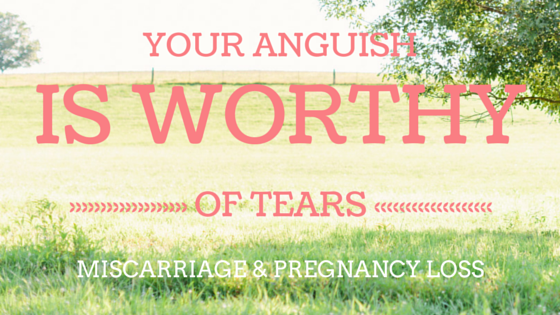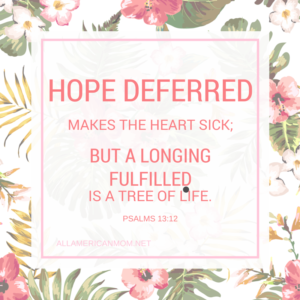Hannah cried. She wept. Month after month. Year after year. Weeping. Sobbing. Tears spilled from her eyes. She couldn’t eat. Her heart grieved.
The life-giving part of her body: her womb-was closed.
Elkanah, her husband didn’t understand her suffering. What’s the matter, Hannah? Why aren’t you eating?” (Samuel 1:8) He continually questioned why she was so sad and why she couldn’t eat. He didn’t understand the yearning that couldn’t be quenched.
A mother.
This is what Hannah wanted more than anything to be. Although her husband doted on her and loved her, his culture dictated that he must marry another woman so that he could have a family.
Hannah was unable to provide children, so he took an additional wife. Humiliating. Shame. Jealousy.
Then, as if her barrenness was not punishment enough, as if seeing her husband’s new wife give birth after birth to precious babies was not anguish enough, the new wife provoked Hannah. She relentlessly teased her. But Peninnah made fun of Hannah because the Lord had closed her womb (1 Samuel 1:6).
Sweet, sweet Hannah-whose heart was already in such despair was now beyond tormented. Hannah was in deep anguish, crying bitterly as she prayed to the Lord (1 Samuel 1:10)
Hannah couldn’t eat; all she could do was lament her troubles to the Lord.
Psalms 13:12 tells us that hope deferred makes the heart sick, but a longing fulfilled is a tree of life. Hannah had a sick heart; her longing for a baby to cradle in her arms had not yet been fulfilled.
Her story is like so many of ours. Those of us who have had miscarriages, late-term loss, or battled infertility can understand the longing of Hannah. Our hearts have ached, our lives have changed, and we find that others don’t quite understand the torment.
Sweet Hannah, who lived over 900 years before Christ, could probably sit with us and cry over a cup of tea as we recount our stories. I imagine we would have much in common with this female biblical great-who at one time was full of great anguish and sorrow.
I cried, too. The disease of infertility was not my reason for sadness; I instead struggled with two miscarriages that occurred within three months of each other.
Miscarriage is common. At least 15% to 20% of all known pregnancies end in the loss of an unborn child before 20 weeks. Miscarriage is the number one pregnancy complication. Contrary to popular belief that a miscarriage is the effect of stress, heavy lifting, or something one controls such as caffeine consumption- a miscarriage is most often the effect of a chromosomal abnormality. Over one million women in the United States have a miscarriage each year. Although it’s widespread, miscarriage is a life event often shrouded in secrecy, seeped in misinformation, and brings much sadness to a family.
Jenny, one of the many brave women who has shared her story with me, described a miscarriage as a life that was lost. Even though I never held those babies they were mine and I acknowledge them.
After my miscarriages I, like many other women, vacillated between periods of depression and anxiety.
Did you know that women are at an increased risk of these two psychological disorders after pregnancy loss? I mourned the loss of two babies that I wanted to hold, embrace, and comfort. But I also felt guilty for mourning- as if I were to blame for not being able to bring my child to term.
Confused and sad. Have you been there?
You know what helped me? Reading the account of Hannah in Samuel 1. It gave me permission to grieve. It helped me stop feeling guilty for being sad.
The verses showed me that God recognizes this unmet longing for a child as a reason worthy of tears and anguish. Hannah’s despair is featured in the Bible. To me, this makes our sadness authenticated, makes it real, and gives us the ultimate permission to grieve.
It’s okay to be sad, and it’s okay to cry. It’s also normal to cry out to God in bitterness.
I invite you to turn in your Bible to Samuel 1. Although I can’t take away the sadness, I do want to introduce you to a brave brave woman who felt the heartache and turned her anguish to God.
Loved Baby Journal:
Read Samuel 1. Underline the words in the chapter that describe how you feel. For example, 1 Samuel 1:10 says, “In her deep anguish” Do you feel anguish? Have you “poured out your soul to the Lord? (1 Samuel 1:13). Look back over the words you have underlined. Isn’t it remarkable how grief and sadness over an unborn child are universal feelings that transcend time?
Give yourself permission to pour out your soul to God. The priest, who watched Hannah cry, thought she was drunk she was so distraught. It’s okay to be distraught. Grief must be grieved.
Re-read Samuel 1: 5. The bible says that Elkanah loved Hannah even though her womb was closed. God doesn’t love us any less if we don’t have children. Don’t love yourself less. Grieve over your lost child, but don’t feel as if you are not enough. Invite your spouse or a trusted confidant to read Samuel 1 with you so they can better understand the thoughts that are permeating your mind. Mourn together.
Love and blessings,
Sarah
I invite you to join the private, online support group Loved Baby: Christian Miscarriage & Pregnancy Loss Support for Women.


